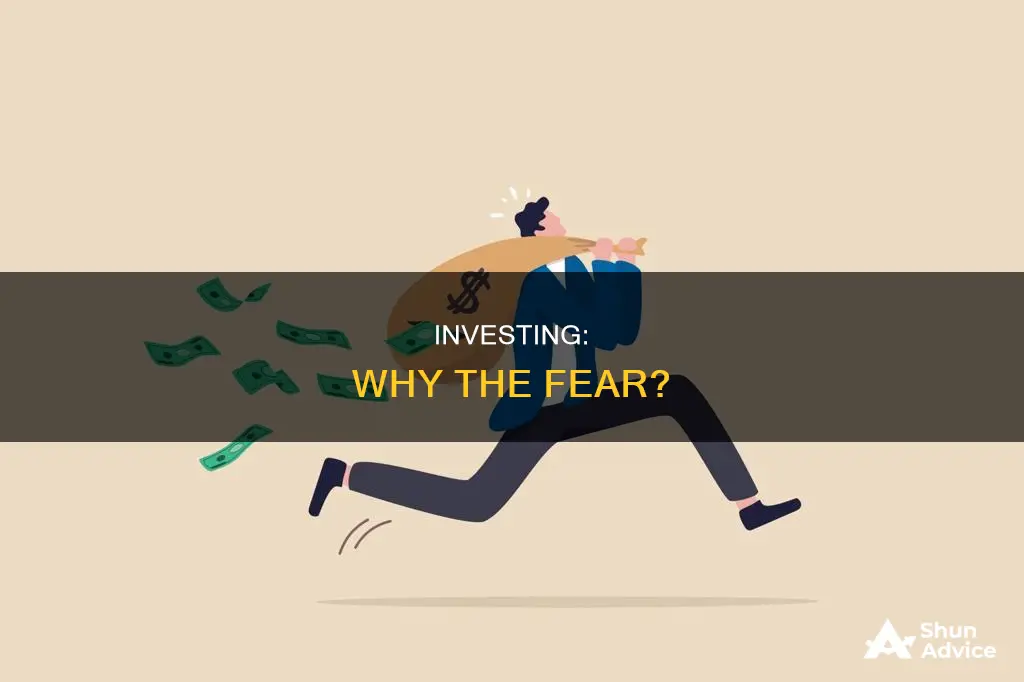
Investing can be intimidating to people for a variety of reasons. Firstly, the fear of losing money is a primal instinct deeply ingrained in our psyche. This fear of loss is psychologically twice as powerful as the pleasure of gain, making people more likely to avoid investing due to the potential losses. Additionally, investing can seem complex and intimidating if one lacks knowledge about how it works. This fear of the unknown is further exacerbated by the Dunning-Kruger effect, where people with low ability at a task overestimate their capabilities, leading to risky decisions. Furthermore, market volatility can be scary, triggering panic and a natural instinct to sell. This is linked to our fight-or-flight response, which can lead to bad financial decisions. Lastly, the fear of falling behind or missing out (FOMO) is prevalent in today's social media-driven world, often pushing people into risky investments.
| Characteristics | Values |
|---|---|
| Fear of losing money | Deeply ingrained in our psyche |
| Lack of knowledge | Intimidating and complex |
| Fear of falling behind | FOMO (fear of missing out) |
| Reacting to market volatility | Natural instinct to panic and sell |
| Fear of commitment | Uncertainty |
What You'll Learn

Fear of losing money
The fear of losing money is a primal instinct, deeply ingrained in our psyche. It is a basic survival instinct—for most of human history, losing resources could mean life or death. This fear is reflected in the concept of 'loss aversion', which suggests that the pain of losing money is psychologically twice as powerful as the pleasure of gaining it.
This fear often manifests as indecision, inaction, inertia, apathy, inattention, and internal resistance. Even the most successful, intelligent, and wealthy individuals find investing scary.
Overcoming the Fear
To overcome this fear, it is important to change your mindset. Understand that investing is not like gambling. It is about making calculated decisions based on research and analysis. Here are some specific strategies to overcome the fear of losing money:
- Diversify your portfolio: Don't put all your eggs in one basket. Diversification is about not losing money permanently, avoiding being stuck in a few companies, sectors, or countries that may perform poorly, and capturing areas of the market that are driving returns.
- Have a safety harness: Run frequent 'what if' scenarios with a financial life manager to prepare for unexpected events.
- Understand your money personality: Recognize that your relationship with money is influenced by your upbringing and cultural interactions.
- Work with a professional: A caring, empathetic financial planner can help you visualize the opportunity cost and make more informed decisions.
- Educate yourself: Start by learning the basics of investing through books, podcasts, and online courses.
Seeking Investors for Your Farm?
You may want to see also

Lack of knowledge
Investing can seem intimidating due to a lack of knowledge about how it works. This fear is a result of the Dunning-Kruger effect, a cognitive bias where those with low ability at a task overestimate their ability. This creates a paradox: the less you know about investing, the more confident you may feel, leading to risky decisions. As you begin to learn more, you realise how little you knew, which can lead to fear and hesitation.
To overcome this fear, it is important to educate yourself about the basics of investing. This can be done through books, podcasts, and online courses. Gaining a basic understanding of investing will help you make more informed and confident decisions. As Warren Buffett said, "Risk comes from not knowing what you're doing."
The more you understand investing, the more confident you will become. However, it is important to remember that you don't need a degree in finance to be a successful investor. Basic knowledge is often enough to get started and make wise decisions.
In addition to educating yourself, it can be helpful to seek guidance from experienced professionals. Working with a financial adviser or planner can provide valuable insights and help you navigate the complexities of investing. They can assist you in understanding the right options for your financial goals and risk tolerance.
By taking the time to learn and seek expert advice, you can overcome the intimidation factor associated with a lack of knowledge and make more confident and informed investing decisions.
It's important to remember that investing is a complex topic, and it's natural to feel intimidated at first. However, by taking the initiative to educate yourself and seek guidance, you can make more informed decisions and work towards achieving your financial goals.
Investments: Top Ten Picks
You may want to see also

Fear of falling behind
The fear of falling behind, or FOMO (fear of missing out), is a very common fear that prevents people from building wealth in the stock market. This fear is amplified by social media, which makes people feel dissatisfied and competitive when they see others living a "better" life. This behaviour can translate to our investment strategy, leading to risky behaviour, such as jumping on an investment bandwagon without doing the proper research.
To overcome this fear, it is important to remember that investing is a long-term game, not a get-rich-quick scheme. As one of the most successful investors of all time, Peter Lynch, said:
> "The real key to making money in stocks is not to get scared out of them."
Instead, focus on your financial goals and stick to your investment plan, regardless of what others are doing. It is also important to remember that good investing is a decades-long game. Do not get tempted to look through a hindsight lens at other 'better' performing investments or forward at 'obvious' future events.
Additionally, it is crucial to understand that genuine investing is not like gambling. It involves making calculated decisions based on research and analysis, rather than taking unnecessary risks. Diversifying your portfolio is also a way to mitigate the fear of falling behind, as it helps to spread out the risk and capture different areas of the market that are driving returns.
Finally, it is important to have a safety harness in place. This involves running frequent 'what if' scenarios with your financial manager to prepare for unexpected events and give you the confidence to make informed investment decisions.
Home Improvement: Who's Spending the Most?
You may want to see also

Reacting to market volatility
Market volatility can be scary. When markets take a downturn, people often panic and sell their stocks. This reaction is linked to the fight-or-flight response. It's important to remember that genuine investing isn't like gambling. It's about making calculated decisions based on research and analysis.
- Have a financial plan: Creating and sticking to a financial plan will keep you from making impulsive decisions in response to market volatility. It will help you stay focused on your short-term and long-term financial goals.
- Stay calm and don't panic: It's crucial to stay calm and stick to your long-term investment plan during market volatility. Remember that sharp movements in the market are a normal part of the investment cycle and not a call to action.
- Limit how often you check your portfolio: Checking your portfolio too often during a downturn can push you to make emotional decisions. Establish a regular portfolio review schedule – weekly, monthly, or quarterly – and stick to it.
- Focus on the big picture: During a downturn, focus on the long-term market trends and your ultimate financial goals rather than short-term losses. This will help you keep things in perspective.
- Remember history: Downswings are a natural part of the markets and are usually short-lived. Markets have historically self-corrected after downturns.
- "Buy low, sell high": Based on your comfort level, consider buying more equities during a market sell-off. However, be cautious of making impulsive decisions and ensure they align with your investment strategy and financial goals.
Remember, investing is a long-term game. It's important to manage your emotions and stick to your investment plan. Time, patience, and discipline are key ingredients for a successful investment experience.
Century-Old Investment Strategies
You may want to see also

Fear of commitment
Investing is often seen as a long-term commitment, which can be intimidating for many people. The idea of locking away money for a significant period can be daunting, and it is natural to wonder: what if I need that money after all?
However, history tells us that the longer you leave your money invested, the more likely it is to increase in value. Therefore, it is essential to balance liquidity (being able to access your money quickly) and growth (increasing its value over time).
This fear of commitment can lead to avoidance, manifesting as indecision, inaction, resistance, apathy, inertia, procrastination, and ultimately, a downward drift in your financial situation.
To overcome this fear, it is recommended to maintain an emergency fund that covers 3-6 months' worth of living expenses. This will give you peace of mind to invest your other funds without worrying about sudden expenses.
Remember, the regret of not taking action today could be far greater than any fear you are experiencing now. Imagine yourself in the future, looking back and realising that you let fear dictate your financial decisions, causing you to miss out on opportunities to grow your wealth and secure your future.
While there are risks involved in investing, as there are in any aspect of life, you can grow your wealth over time by investing systematically and controlling your behaviour. By using your money wisely, you can design the life you want to live and enjoy happier days ahead.
How to Legally Invest for Others
You may want to see also
Frequently asked questions
Investing is intimidating to people because of the fear of losing money, which is deeply ingrained in our psyche. This fear of loss is twice as powerful as the pleasure of gain.
The Dunning-Kruger effect is a cognitive bias where people with low ability at a task overestimate their ability. In the context of investing, this means that the less someone knows, the more confident they might feel, leading to risky decisions.
FOMO often prevents people from building wealth in the stock market. People tend to compare their investment results with others, leading to a sense of dissatisfaction and competitive behaviour. This can result in risky decisions such as jumping on investment bandwagons without proper research.
Market volatility can trigger panic and a natural instinct to sell. This is linked to the fight-or-flight response, where investors want to get away from the threat as quickly as possible. It is important to stay calm and stick to a long-term investment plan during volatile markets.







